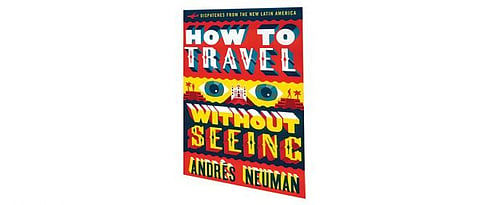

The author, a well-known member of a new generation of young writers writing in Spanish, is sent on a book tour to promote a prize winning novel around 18 Latin American countries and Miami. Frustrated at first that he would not have more time in each country, he decided to make a virtue out of necessity by adapting the style and structure of the present book to what he claims is the essence of contemporary tourism, which is to travel without seeing anything.
I began to imagine a restless journal, told from a tight point of view and made up of a series of compact entries. One observation for each situation. One paragraph for each observationThere would be no pauses. We no longer travel like that. We no longer see that way. Without the time to recreate totalities or to give the impression of the whole he decided to embrace the fragments. Which is what this book isa series of short paragraphs, mostly unrelated to the previous one, each one a snapshot, but relying on the poetry of the immediate, on looking on with the radical astonishment of the first time.
Whatever one feels about the premise of the book (there are after all plenty of travellers who do pause and travel reflectively, seeking authentic contact with locals and local culture, and there are many others whose purpose is not to see at all, but do things like just lie on a beach) it does lend itself to a catchy title. And that purpose served, the author does manage to see an awful lot himself, not just of airports and hotels, but of the capital cities and some sights near them like Lake Titicaca in Bolivia and the pyramids of Teotihuacan in Mexico.
His encounters and discussions with a variety of people (far more diverse than taxi drivers and hotel staff ) give him plenty of opportunity to reflect on Latin American literature, politics and history, questions of identity and persistent differences in culture and styles of speech despite growing cultural homogenisation. There are several snippets of contemporary Latin American poetry, and the writing style is quirky and rich in aphorisms (some of which this reviewer found a bit elliptical).
There is plenty of humour such as when the author is seeking clearance from his editor back in Spain to visit a town in Honduras where a deposed president is holding out, only to be asked but arent you writing about what you arent seeing
And this should sound familiar to Indians as he wonders why, on landing, we get up to deplane as soon as possible
Why does this line of impatient people, this immobile herd, wait in the most uncomfortable position for the moment of stampede, which leads in turn to reflections on doing our best to cut short the little time we have left in life, and a line from Lorca, The dead moan, waiting for their turn. This is a book certainly for those interested in getting a feel of Latin America (although definitely not as a guide book), but above all for connoisseurs of fine writing, and those interested in the emerging literary scene of contemporary Latin American writers and filmmakers.
